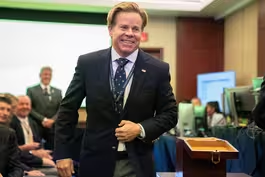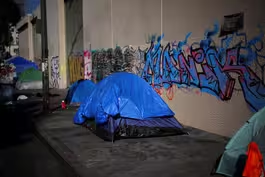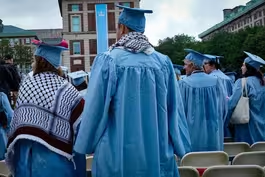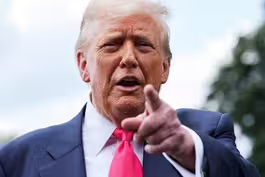
Inside Gaza’s neonatal wards where babies battle the odds
Clip: 7/24/2025 | 8mVideo has Closed Captions
Inside Gaza’s neonatal wards where babies born into a war zone battle the odds
President Trump’s Middle East envoy announced that he was bringing his team home from Gaza ceasefire negotiations. Steve Witkoff said he was withdrawing from talks where Israel, Hamas and mediators had been discussing a deal. As Nick Schifrin reports, it comes as nearly all of Gaza’s two million people are hungry. A warning, images in this story are disturbing.
Problems playing video? | Closed Captioning Feedback
Problems playing video? | Closed Captioning Feedback
Major corporate funding for the PBS News Hour is provided by BDO, BNSF, Consumer Cellular, American Cruise Lines, and Raymond James. Funding for the PBS NewsHour Weekend is provided by...

Inside Gaza’s neonatal wards where babies battle the odds
Clip: 7/24/2025 | 8mVideo has Closed Captions
President Trump’s Middle East envoy announced that he was bringing his team home from Gaza ceasefire negotiations. Steve Witkoff said he was withdrawing from talks where Israel, Hamas and mediators had been discussing a deal. As Nick Schifrin reports, it comes as nearly all of Gaza’s two million people are hungry. A warning, images in this story are disturbing.
Problems playing video? | Closed Captioning Feedback
How to Watch PBS News Hour
PBS News Hour is available to stream on pbs.org and the free PBS App, available on iPhone, Apple TV, Android TV, Android smartphones, Amazon Fire TV, Amazon Fire Tablet, Roku, Samsung Smart TV, and Vizio.
Providing Support for PBS.org
Learn Moreabout PBS online sponsorshipGEOFF BENNETT: Welcome to the "News Hour."
President Trump's Middle East envoy today announced that he was bringing his team home from Gaza cease-fire negotiations.
AMNA NAWAZ: Steve Witkoff blamed Hamas and warned, the U.S. and Israel would now pursue -- quote -- "other means" to release Israelis still held hostage more than 21 months after the October 7 terrorist attacks.
Nick Schifrin's been following all this and joins us now.
So, Nick, tell us, what do we know about what led to this decision to walk away from those talks?
NICK SCHIFRIN: Earlier today, Israel announced that it would withdraw its negotiators from Doha to -- quote -- "for additional consultations in Israel."
And this afternoon Witkoff made the announcement that you just said, saying he too was bringing his team home for additional consultations.
And he used this word.
He said Hamas' latest response -- quote -- "shows a lack of desire to reach a cease-fire in Gaza.
Hamas does not appear to be coordinated or acting in good faith."
But, Amna, sources I talked to tonight say that it's not clear that this is the end of negotiations.
A U.S. official tells me that Hamas' latest response demanded that Israel release 200 high-profile Palestinian prisoners, rather than 125, as Israel had offered, and also adjusted slightly the map exactly where troops, Israeli troops, would go when that cease-fire began, and that this official says that the mediators, including Qatar and Egypt, did not see that as major changes and actually thought that the momentum was positive toward a deal.
And there are Israeli officials tonight who are indicating that this is actually just a tactic, a ploy to get Hamas to move back toward the Israeli stance.
But there is also that very clear threat that Witkoff made in the statement that you read that we will -- quote -- "pursue other means to release hostages."
That suggests a renewed offensive by Israel in Gaza.
And tonight Israel is criticizing an announcement just the last few hours by Emmanuel Macron, the president of France, who said that France would recognize an independent Palestinian state next week during a high-profile U.N. event.
AMNA NAWAZ: Meanwhile, on the ground in Gaza, as you have been reporting, humanitarian organizations and others have been sounding the alarm about malnutrition and famine.
UNICEF today issued a dire statement.
What did they say?
NICK SCHIFRIN: It did.
UNICEF said today that, in the last 48 hours, four children have died of starvation.
UNICEF said -- quote -- "These deaths are unconscionable and could have been prevented."
The U.N., of course, continuing to demand that more aid be allowed into Gaza.
The number of children admitted for treatment for malnutrition, according to the U.N., reached the highest level of this conflict in the last year-and-a-half.
The U.N. says nearly all of Gaza's two million people are hungry.
And the most vulnerable, of course, are children, but also pregnant women.
One in four children and breast-feeding mothers are malnourished.
And we have a story now.
And a warning: The images in this story are disturbing.
Marwafd (ph) Al-Najjar only had three months with her son, Yaya (ph).
The baby is wrapped in his mother's arms and wrapped in a shroud.
The family is burying him, a victim of war killed not by missiles, but by malnutrition.
NAJLAA AL-NAJJAR, Aunt (through translator): We couldn't provide food for him and his older siblings.
We couldn't provide milk.
NICK SCHIFRIN: This week, across Gaza, cries for help, urgent appeals to save starving children, like Aya Aziz (ph).
She is 4 months old, but weighs less than seven pounds.
WOMAN (through translator): Look at her.
You can see her bones.
There's no milk available anywhere.
What am I supposed to do?
Is it just because she's from Gaza?
Do our children have to go through this just because they're from here?
NICK SCHIFRIN: The U.N. and international aid organizations in Gaza are warning of mass starvation.
Palestinian health officials say, since the beginning of the war, at least 115 Gazans, mostly children, have died from hunger, a quarter of them in recent days.
And finding food can be deadly.
In the last two months, the U.N. says nearly 900 Palestinians have been killed outside humanitarian aid sites.
Where there is hunger, 35-year-old Karam (ph) Sobh searches through scraps to find sustenance.
He collects trash that his extended family uses to bake bread.
There are a lot of mouths to feed, eight children for whom every drop of water is precious, who have to worry about what should preoccupy no child, how to survive, how to eat.
Atef is Karam's brother.
ATEF SOBH, Gaza Resident (through translator): This is famine.
They bring us aid on these trucks and all these young people go to get some aid.
My kids go with them too.
If you're going for a bag of flour, you're walking to your potential death.
The situation is very, very difficult.
Life is very depressing.
We can stay a whole week without bathing, no water, no flour, no food.
NICK SCHIFRIN: Israel blames Gaza's hunger on Hamas.
It says violence at aid sites is Hamas-instigated and Hamas steals food to either feed themselves or sell to fund new fighters.
But hunger now stalks the most vulnerable.
At the neonatal ICU in Gaza City's Al Shifa Hospital, babies battle for breath.
They are born into war, into a place that cannot provide what they need to live.
The card reads, "Time of death 11:30 a.m." DR. JOANNE PERRY, Doctors Without Borders: Sadly, we lose babies every week.
Last week, we lost a baby because of loss of electricity.
The baby's on a ventilator, so it doesn't receive oxygen.
So the ones that survive, we call them miracle babies.
NICK SCHIFRIN: Dr. Joanne Perry is the Gaza medical team leader for Doctors Without Borders.
This is her third trip to Gaza in the last year-and-a-half.
And she says the situation is increasingly catastrophic.
We spoke to her from Gaza City.
DR. JOANNE PERRY: The rates of malnutrition in all our patient populations are increasing weekly.
These malnourished mothers are having high-risk pregnancies.
And the consequence of that is many of them are having their babies early.
So our neonatal ICU is full with premature babies.
Our babies are sharing incubators, which is really unacceptable.
The mothers themselves are exhausted.
They're frail.
We're supporting them in breast-feeding.
But when you're hungry and malnourished, you're going to produce less milk.
So babies are struggling.
We have a baby in the neonatal ICU that was born three months early, and the mother died in the explosion.
And the father arrives every day on his crutches because his legs have been amputated and comes to see his baby every day.
NICK SCHIFRIN: She says the hospital is short on supplies.
Baby formula is day by day, only two diapers a day for newborns.
And so a ward once full of hope is now full of fear.
DR. JOANNE PERRY: Many families in Gaza are large.
Children are treasured.
And it actually gave me hope a year ago when -- in the delivery room when the mothers were happy and they had a new child.
But now we don't see very many smiles.
They're worried, how are they going to feed the baby?
How are they going to diaper the baby?
How am I going to care for my other children when I have no food to offer?
So it's not such a happy occasion anymore.
And it's legitimate.
It's valid.
They don't see a future for their newborn baby.
NICK SCHIFRIN: But these babies can't yet feel that fear, and so they will fight for life as long as they can.
For the "PBS News Hour," I'm Nick Schifrin.
Crackdown on unpaid student loans could impact millions
Video has Closed Captions
Clip: 7/24/2025 | 8m 21s | How the government's crackdown on unpaid student loans could impact millions (8m 21s)
GOP Rep. Haridopolos recaps Trump's first 6 months
Video has Closed Captions
Clip: 7/24/2025 | 8m 23s | 'We kept our promises': Rep. Haridopolos touts GOP victories in Trump's first 6 months (8m 23s)
News Wrap: Trump urges cities to clear homeless from streets
Video has Closed Captions
Clip: 7/24/2025 | 6m | News Wrap: Trump pushes cities to remove homeless people from streets (6m)
Trump ramps up pressure on Powell in Fed visit
Video has Closed Captions
Clip: 7/24/2025 | 8m 35s | Trump ramps up pressure on Powell to cut interest rates during visit to Federal Reserve (8m 35s)
What Columbia's settlement means for higher education
Video has Closed Captions
Clip: 7/24/2025 | 8m 12s | What Columbia's settlement with the Trump administration means for higher education (8m 12s)
Why the DOJ met with Epstein accomplice Ghislaine Maxwell
Video has Closed Captions
Clip: 7/24/2025 | 4m 41s | Why the DOJ met with Ghislaine Maxwell amid backlash over Trump's Epstein ties (4m 41s)
Providing Support for PBS.org
Learn Moreabout PBS online sponsorshipSupport for PBS provided by:
Major corporate funding for the PBS News Hour is provided by BDO, BNSF, Consumer Cellular, American Cruise Lines, and Raymond James. Funding for the PBS NewsHour Weekend is provided by...

















